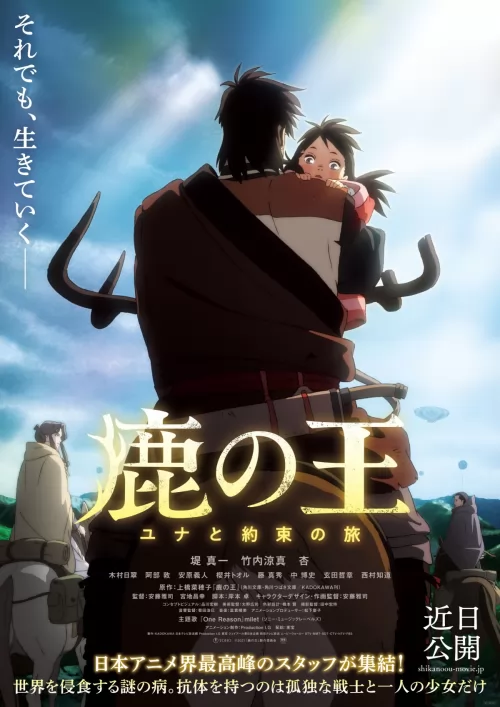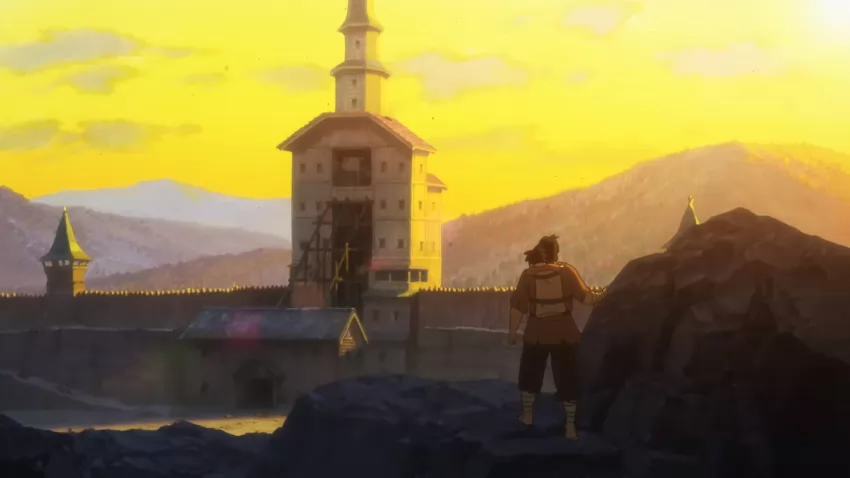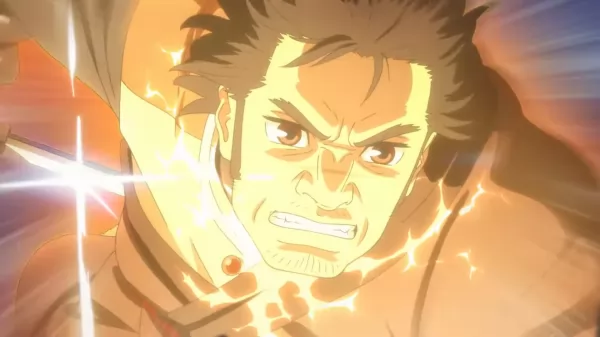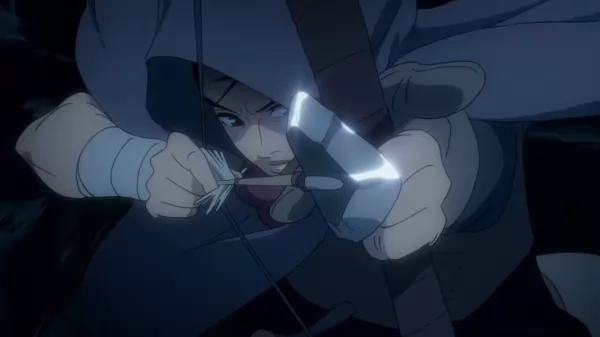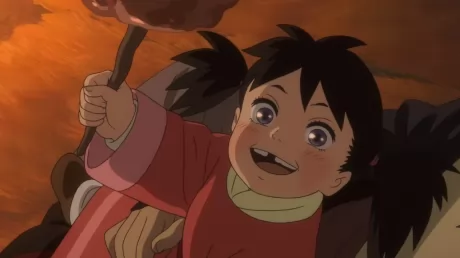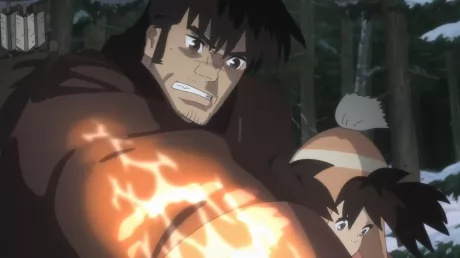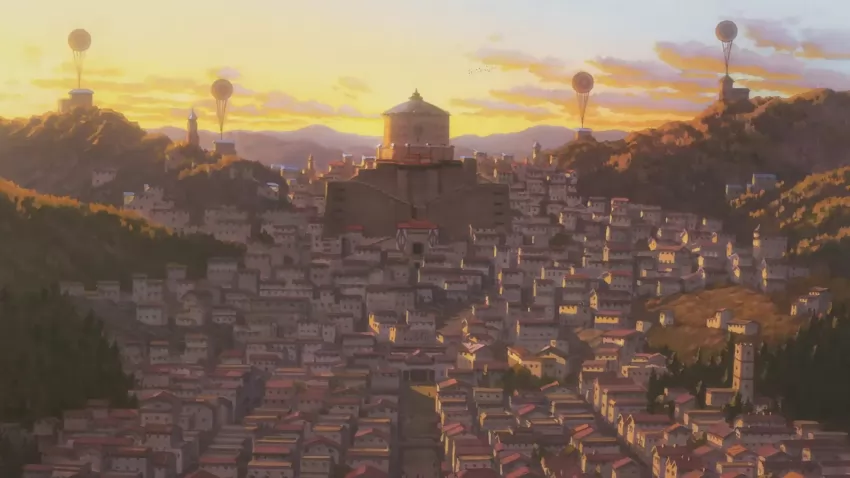The film is available in selected Italian cinemas starting today, Monday 27 June 2022 The Deer King – The Deer King, directorial debut of the ex-Ghibli animator Masashi Ando, assisted by his colleague Masayuki Miyaji. In recent days we have guided you to the discovery of Production IG, the studio that made the feature film, and we retraced the career of a major name in Japanese animation over the past thirty years. We have also analyzed the numerous references and homages of The Deer King to Studio Ghibli, an unforgettable dream factory whose poetics he seems to want to propose as heir.
But now it’s time to give a verdict. We have seen The Deer King in preview and we propose the review of a very intimate and original fantasy film, in the topics covered, which will immediately make those who miss Hayao Miyazaki’s masterpieces feel at home. And which we hope will be only the first of a long series in Masashi Ando’s career as a director.
Fathers, sons and mysterious plagues
The Deer King was born as an adaptation of the homonymous saga of highly successful novels by Japanese writer Nahoko Uehashi, and is set in a fantasy world where the people of Aquafaafter a long war, was defeated and subjugated by theEmpire of Zol.
Among the soldiers who fought for Aquafa there is Van, the last survivor of the legendary tribe of the Broken Horns, who after being taken prisoner is forced to work in a salt mine of the Zoliani. One night, the mine is attacked by a pack of wolves carrying a terrible disease, the Mittsal o Black Wolf Fever, which infects and kills anyone bitten by these creatures. The only ones to survive are Van e Yuna: the first escapes the contagion for unknown reasons, indeed acquires a mysterious power in the right arm; the second is an orphan girl who becomes attached to the protagonist and begins to call him dad. Escaping death, the two begin to wander the kingdom and settle in a peaceful village dedicated to deer breeding. The blood of the two survivors, however, could represent the keystone for the much coveted care for the Mittsal, and for this reason Van and Yuna find themselves hunted by the Empire of Zol and a skilled pursuer. To help them there will be an unexpected ally: Hossalthe doctor of the imperial court and the one who most of all wants to defeat the disease.
Just under two hours long and written by veteran screenwriter Taku Kishimoto (Haikyuu !!, Fruits Basket, Ranking of Kings), the first work by Masashi Ando pays homage to the great masters of the past thanks to the obvious references to the Ghiblian filmography that we have already had the opportunity to investigate, but at the same time acquires its own precise identity.
The merit is obviously of starting materiala literary epic that has conquered the Japanese public thanks to a masterful fusion of themes such as war, politics, medicinereligious beliefs and superstitions, family and supernatural ties.
And that’s what makes it special The Deer King and differentiate him from most fantasy animated feature films, including his spiritual parents. The first great merit of this film is that the setting in which the events are set is indeed fictitious but very credible and well developed in its dynamics, and is presented to the viewer through the dialogues of the characters, without resorting too much to exposure and to explain that they would only end up weighing down the vision.
A promise partially kept
But before his intrigues, The Deer King is the story of the journey of its two protagonists, Van and Yuna. The original subtitle of the film is Yuna to Yakusoku no Tabiwhich is translatable as “The journey of Yuna and the promise”.
The promise referred to represents the leitmotif of the entire film, the motivation that drives the taciturn but powerful Van, archetype of the silent hero and melancholy with a tragic past, to embark on a new journey to escape his destiny and return to live a normal life with the person most dear to him. The very young Yuna is a character of Ghiblian memory – as we have already shown you on these shores – who represents the purest spirit of nature and pacifism so dear to Masashi Ando’s masters, and will play a fundamental role in the course of history. The trio of main characters is completed by the young doctor Hossalin our opinion the most successful figure of the whole work as a vehicle for a fairly rare topic in this genre: medicine. Just like Van and Yuna, Hossal also embarks on a journey during the film, both literally and figuratively: the one in search of the coveted cure for the Mittsal plague, an evil that seems to have extra-earthly (and therefore potentially incurable) origin. ) and which seems to affect only a part of the population. The characterization of Hossal is very convincing and the film describes well his tenacity and his fortitudethus giving a touch of originality to a product that, under almost every other aspect, is quite derivative, but without this term necessarily taking on a negative connotation.
Unfortunately, The Deer King he ends up being crushed by his own ambitions. In the previous paragraph we said that Ando’s directorial debut manages to carve out its own identity, and this is absolutely true as regards the premises and the topics addressed. A little less, however, from the point of view of execution.
The time available, in fact, is not sufficient to adequately develop all the implications of the plot, and the script by Taku Kishimoto fails to give the right space to the multiple souls of the film, ending up penalizing some of these. The most evident example is given by the political-war subtext linked to the clash between Aquafesi and Zoliani, which in practice is a fairly weak pretext to start the story.
The Deer King, over the course of its duration, often changes sub-genre, passing from rural and bucolic fantasy in the first act to a journey on the road of the group of heroes in the second, and then ending with an eventful but also very poetic ending, without however these transitions taking place with the right continuity. And it is precisely for this reason that the second part, the central one, represents the slowest and most bite-free of the entire production.
Even the characters are affected by this disjointed and poorly amalgamated script and, with the exception of Van and Hossal, they are all not fully developed. The most disappointing of all is Saethe skilled huntress (pursuer, in the Italian adaptation) put on the trail of Van and Yuna, whose actions are quite forced as there is no adequate study of his background that justifies them satisfactorily. Too bad, because she had all the credentials to prove to be one of the most interesting figures in the film.
A majestic world
Masashi Ando is a phenomenal artist who it has always left its mark in any work in which he has participated, and now that he is finally at the top of the creative process we are sure that he will give us even more incredible shows.
The technical department of The Deer King, although not as extraordinary as the Ghiblian masterpieces which inspired it, it is already an excellent example. The staff of artists and animators of Production IG, under the guidance of Ando, gives life to a vivid, pulsating, believable and realistic fantasy worldthanks also to a slightly dull and not very saturated color palette that underlines the darker atmosphere of the narrative, in a way not unlike what happened in Princess Mononoke. The drawings and animations, they see a clear predominance of more traditional techniques (the use of CGI and digital effects is reduced to a minimum), they are of excellent quality and emphasize every moment of the narration, be it a fight or a simple scene of everyday life, thanks attention to many small details which makes the difference between a poor job and a superfine job. The Deer King it is one of the very few animated films of the recent era where you can really breathe the magic of Studio Ghibli, and for this alone it deserves to be seen, if possible in a movie theater.
Even the music, made by the composer Harumi Fuukiare clearly inspired by the works of the legendary Joe Hisaishi presenting a sumptuous accompaniment and of great impact, dominated by sounds that enhance the epic tone of the narration and which at the same time adapt to the most peaceful, delicate and introspective moments.
We are faced with one of the most successful aspects of the film, which reaches its peak in the splendid closing theme One Reason by Milet. A poignant and emotional ballad, melancholy and full of hope, which is the background to the credits and where the young singer shows off her warm and powerful voice.
Finally, let’s spend a few words onlocal edition. The Deer King sees Francesca Bertuccioli at the direction of the dubbing and Olivia Costantini at the Italian dialogues, while Dario Oppido (Van), Emma Puccio (Yuna) are part of the cast of voices Manuel Meli (Hossal) and other important names in the sector such as Gianni Giuliano and Paolo Buglioni. Overall, it comes down to a very good work of adaptation and the voice actors are confirmed to be spot on for their respective characters, especially Meli in the role of Hossal.

